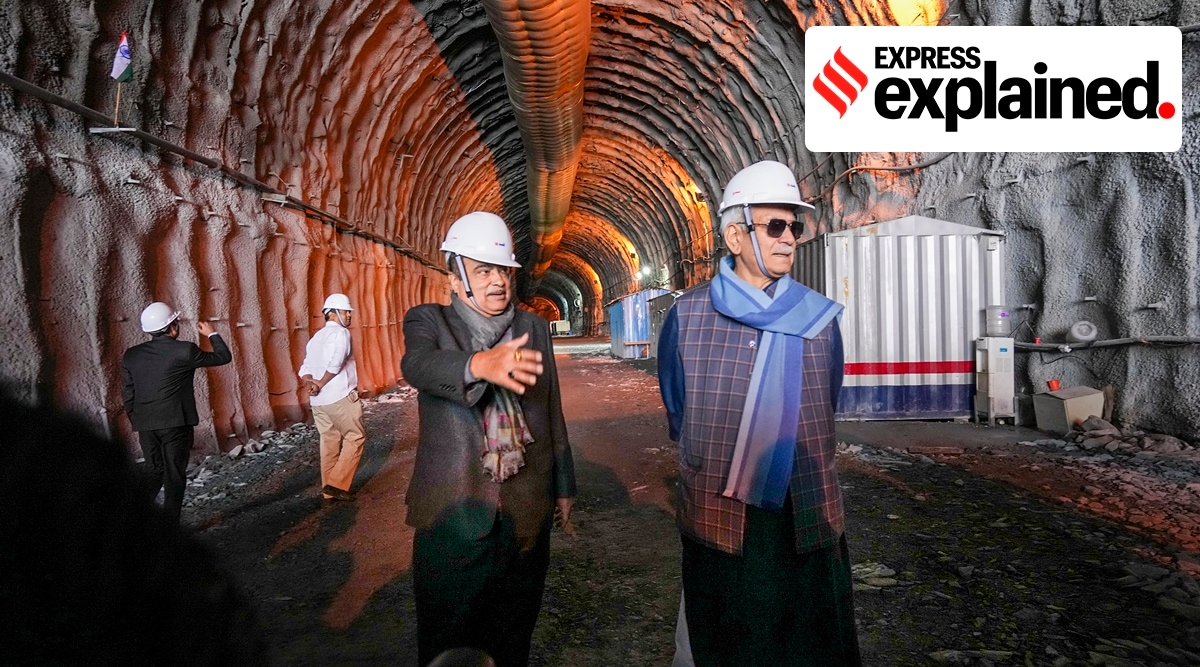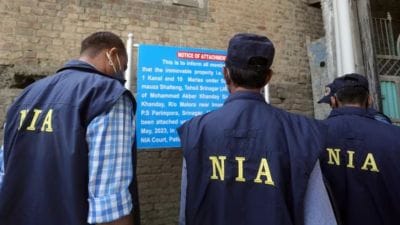Why the Zojila tunnel promises to revolutionise connectivity to Ladakh
The tunnel, said to be Asia’s longest of its kind, will provide all-year, all-weather connectivity between Srinagar and Leh, and also significantly cut down travel time.
 Union Minister for Road Transport & Highways Nitin Gadkari with J&K Lt. Governor Manoj Sinha inspects the construction work of Zojila Tunnel in the Baltal area on April 10. (PTI Photo)
Union Minister for Road Transport & Highways Nitin Gadkari with J&K Lt. Governor Manoj Sinha inspects the construction work of Zojila Tunnel in the Baltal area on April 10. (PTI Photo) Union Road Transport and Highways Minister Nitin Gadkari on Monday (April 10) inspected the under-construction Zojila tunnel, which will establish all-weather connectivity between the Union Territories of Ladakh and Jammu and Kashmir.
Gadkari visited the project site along with J&K Lieutenant Governor Manoj Sinha and members of the Parliamentary Consultative Committee on Road Transport and Highways.
As part of an ongoing project to improve connectivity in the region, 19 tunnels are being constructed at a cost of Rs 25,000 crore. As of now, 38 per cent of the work on the Zojila tunnel, said to be India’s longest, has been completed.
What is the Zojila tunnel?
The Zojila tunnel will be India’s longest road tunnel, and is expected to be Asia’s longest bi-directional tunnel, boasting a length of 14.15 km.
 A map of the under-construction Zojila and the Z-Morh tunnels. (Express Graphic)
A map of the under-construction Zojila and the Z-Morh tunnels. (Express Graphic)
A connecting tunnel from Z-Morh on NH1 to the Zojila tunnel will be built in the Zojila Ghats between Sonmarg and Kargil. This involves the development and expansion of the 18.475-km highway between Z-Morh to Zojila. A 3-km stretch will be expanded; the rest will be newly developed. The highway will have two twin-tube tunnels, five bridges, and two snow galleries.
The work on the entire 33-km span is spread between two union territories – Jammu and Kashmir; and Ladakh.
Why is the tunnel needed?
Currently, the commute between Srinagar and Leh, the largest city in Ladakh, takes over 10 hours on a good day and passes through extremely inhospitable terrain. The Zojila Pass is a high mountain pass through which one has to travel in order to make the journey.
During harsh winters, this route is closed due to fears of avalanches, landslides and slippery roads, with areas beyond the pass cut off from the rest of the country for at least five months. With the Zojila pass shut, air connectivity is the only option, and airfares can skyrocket to over Rs 40,000 during peak winter months (For context, this much money can fetch a flight ticket between Delhi and London).
The upcoming Zojila tunnel will provide perennial connectivity between Ladakh and the rest of the country. This will not just benefit civilians living and employed in the region, but also the military, by expediting movement of troops and supplies in this vitally important strategic region.
How much commute time will the tunnel save?
Apart from providing perennial connectivity, the tunnel also promises to cut travel time between Kashmir and Ladakh. The distance from Baltal to Minamarg, currently 40 km, will come down to 13 km with travel time expected to be cut by an hour and a half.
The journey is also expected to be less strenuous. Given Zojila’s inhospitable terrain, many fatal accidents are reported on the route each year. Once the tunnel project is completed, chances of accidents will significantly come down.
The project is expected to lead to the integrated development of both Union Territories. Speaking to reporters during his visit on Monday, Gadkari said, “From a strategic point of view, this is important. This area will be developed so people do not have to migrate. This is going to increase employment potential in this region as well.”
What is the cost of the project?
The tunnel is being built at a cost of more than Rs 4,600 crore. It is expected to be completed by December 2023.
- 01
- 02
- 03
- 04
- 05






































